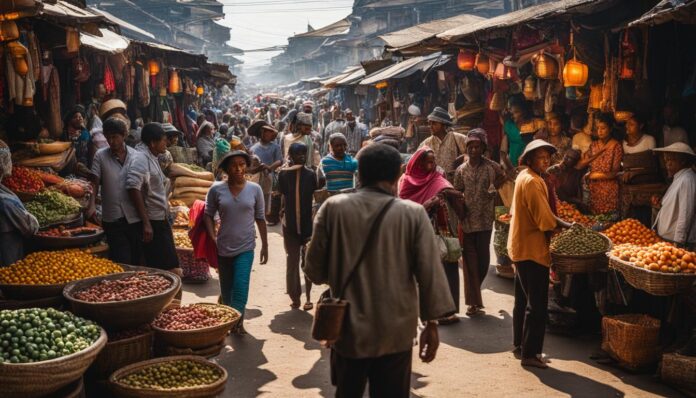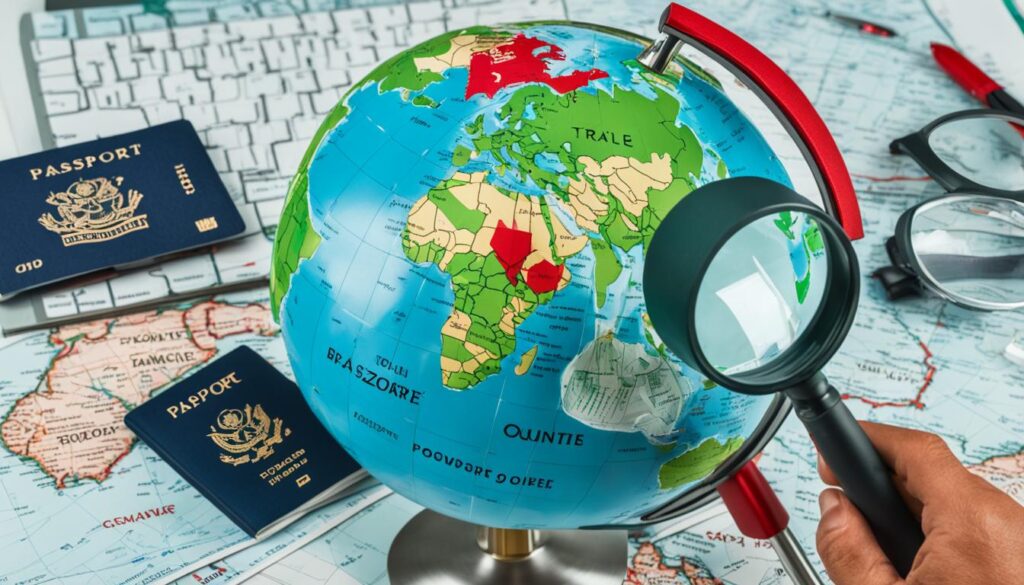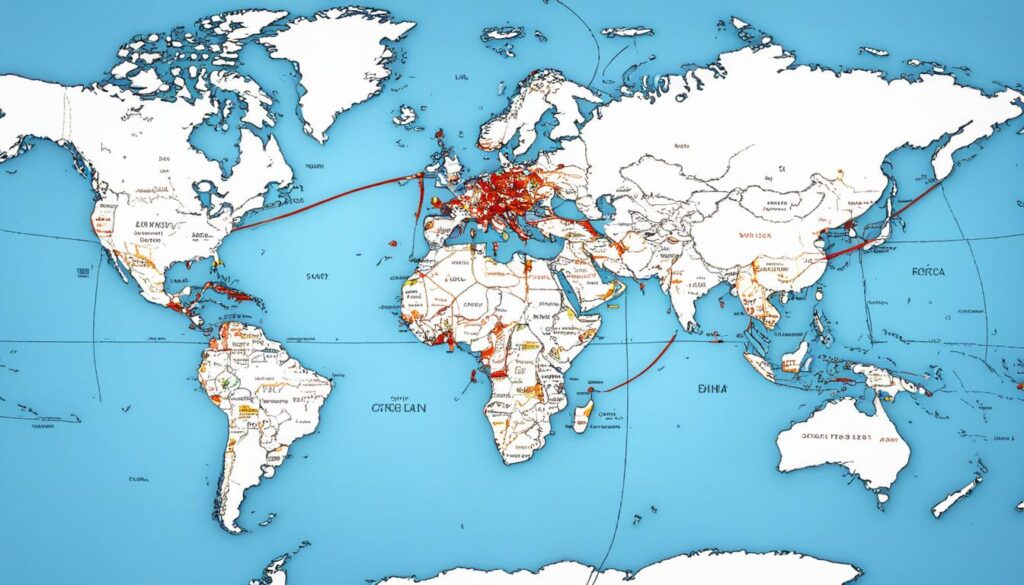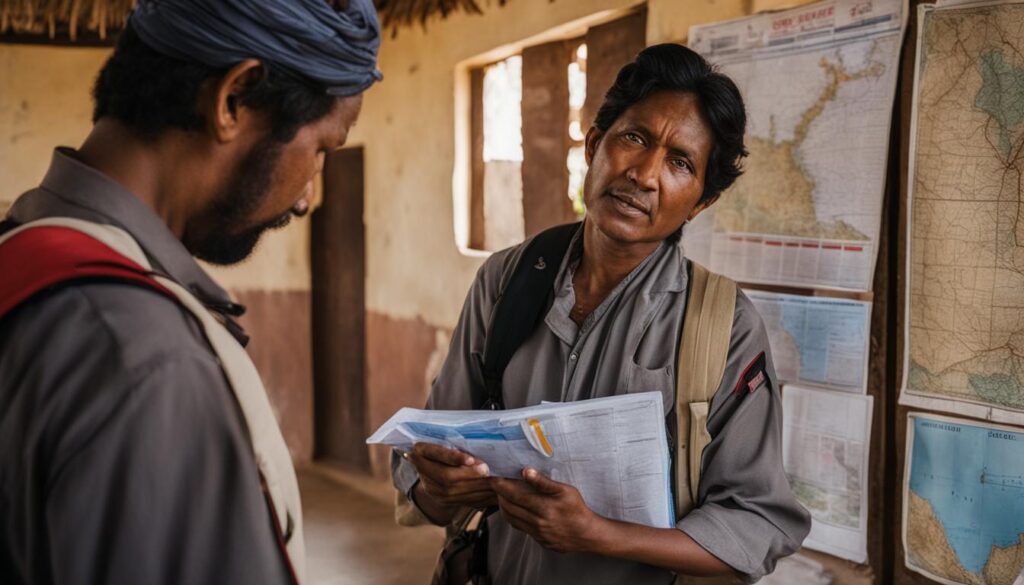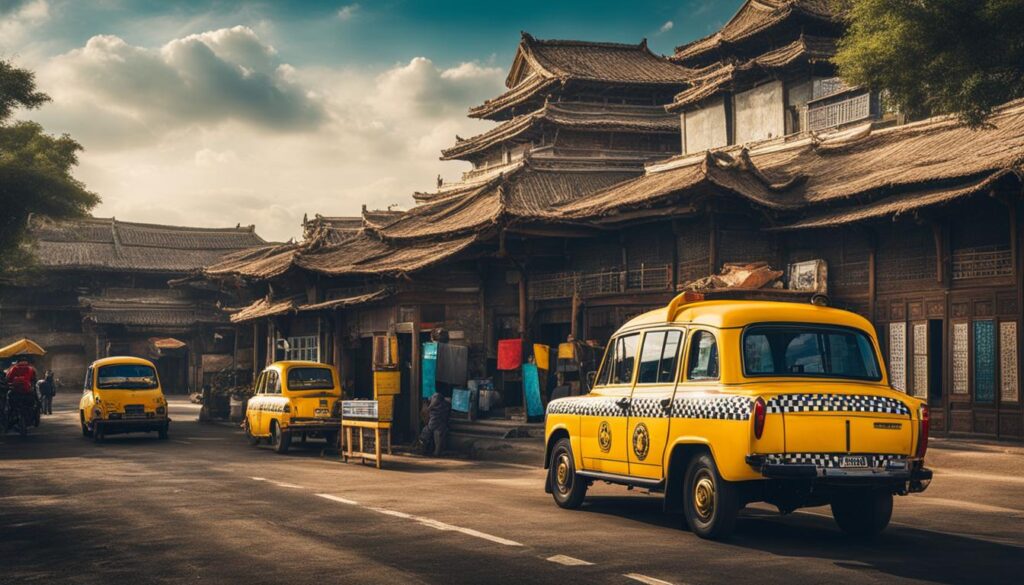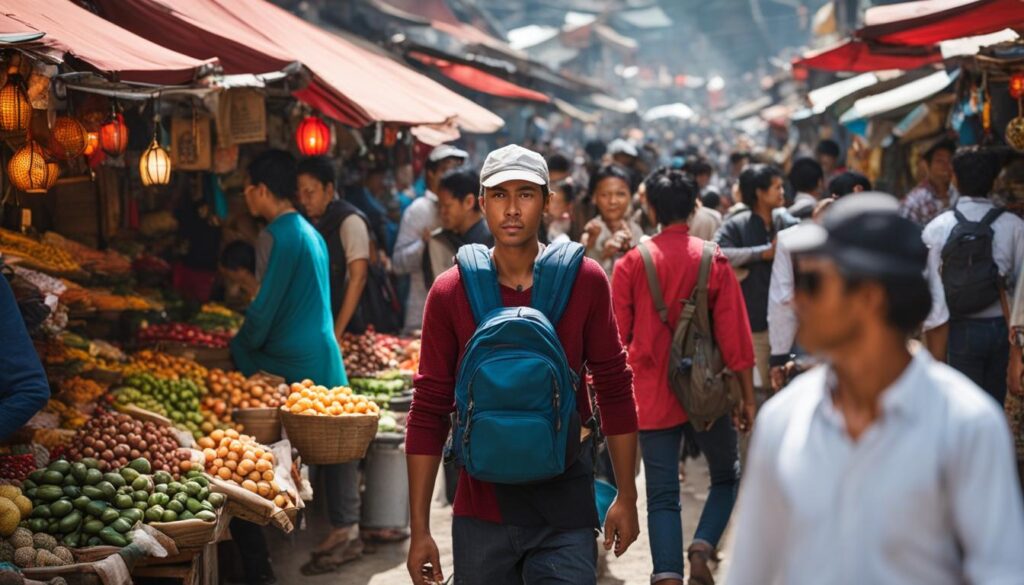Are you planning a trip to a developing country? While such trips can be memorable and exciting, they also involve certain risks. To ensure your safety during your travels, it is essential to follow some basic tips and precautions.
In this section, we’ll explore some critical safety measures you should keep in mind when traveling to a developing country. From researching your destination to securing your valuables, we’ll cover it all. By applying these tips, you can have a worry-free journey and fully enjoy your trip.
So, let’s get started! First up, let’s take a look at what travel safety in developing countries means and some essential tips for keeping yourself safe on your adventure.
Understanding the Risks in Developing Countries
Traveling to developing countries is an exciting and adventurous experience, but it also comes with potential risks that you need to be aware of. Before you embark on your journey, it is crucial to understand the risks and take steps to protect yourself. By doing so, you can enjoy your trip with peace of mind.
Risk management for travelers involves identifying potential hazards and developing strategies to mitigate them. Some of the common risks associated with traveling to developing countries include:
| Risk | Description | Mitigation |
|---|---|---|
| Health Risks | Travelers to developing countries may be at risk of contracting diseases such as malaria, dengue fever, or typhoid. | Get vaccinated before your trip. Use mosquito nets, insect repellent, and sunscreen. Avoid street food and drink only treated water. |
| Political Unrest | Some developing countries may experience political instability, demonstrations or terrorism threats. | Stay informed of local news, avoid demonstrations and attend areas of high tension, and be aware of emergency procedures. |
| Natural Disasters | Developing countries are prone to natural disasters such as earthquakes, floods and hurricanes. | Stay informed of weather patterns, avoid high-risk areas, be aware of emergency procedures and have a plan in place. |
To manage these risks, it’s essential to conduct thorough research about the country you are visiting ahead of time. The US Department of State’s website provides up-to-date information on potential risks and safety concerns. Staying safe while traveling abroad requires preparation, careful planning, and taking necessary precautions.
Remember, your safety is your responsibility, and taking proactive steps can go a long way in mitigating risks.
Researching Your Destination
Before embarking on your trip, it’s important to research your destination thoroughly to ensure your safety. Understanding cultural norms, local laws, and potential safety concerns will help you prepare adequately for your journey. Here are travel safety guidelines and safe travel practices to consider:
- Research the political situation in your destination country.
- Find out about local customs and make necessary arrangements to comply with them.
- Check the crime rate and areas to avoid in the country you’re visiting.
- Read up on local transportation options and how to use them safely.
- Find out if you need any specific vaccinations or medical precautions to take before traveling.
For instance, some countries may have discriminatory practices that you should be aware of. Failure to observe cultural norms may result in harm, which is why understanding local practices will help keep you safe. Consider researching the following when trying to understand local customs:
- Dress codes
- Food and drink practices
- Religious practices
- Gender norms
Remember that different countries do things differently, so you should prepare for any changes that you might encounter. Understanding helpful travel safety guidelines and safe travel practices will reduce the likelihood of incidents that may hamper your overall experience.
Travel Insurance and Medical Preparations
Protecting your health and ensuring access to medical care is crucial when traveling to developing countries. While it is essential to maintain a healthy lifestyle while traveling, it is also important to be prepared for minor illnesses and injuries that may occur. Here are some safety tips for traveling to developing nations:
Get the Right Vaccinations
Before traveling to a developing country, make sure you get the necessary vaccinations. Depending on your destination, some vaccines may be mandatory, while others are recommended. Speak with your doctor or a travel medicine specialist to determine which vaccinations are required or recommended for your journey. Remember to bring your vaccination record with you while traveling.
Travel Insurance
Investing in travel insurance is a crucial step in ensuring your safety while traveling to a developing nation. Travel insurance can cover medical emergencies, trip cancellations, lost or stolen luggage, and more. Before purchasing travel insurance, read the policy carefully to understand what is covered and what is not.
Pack a First Aid Kit
Carrying a basic first aid kit can be helpful in dealing with minor injuries and illnesses that may occur while traveling. Be sure to include items such as bandages, antiseptic wipes, pain relief medication, and any prescription medication you may need.
Mental Health and Emergencies
Developing nations can present unique challenges to mental health, particularly when it comes to culture shock and language barriers. Before your trip, research possible resources for mental health emergencies or counseling. Some travel insurance policies also offer mental health support services.
By taking the necessary medical precautions and investing in travel insurance, you can enjoy your travel experience to a developing country with peace of mind, confident that you are prepared for any medical emergency that may arise.
Secure Accommodations and Transportation
One of the most important aspects of travel safety is finding secure accommodations and using safe transportation methods. By taking the right precautions, you can enjoy a worry-free trip. Here are some guidelines to keep in mind:
Selecting Accommodations
When researching accommodations, prioritize safety and security over cost. Choose reputable hotels or hostels with good reviews and a proven track record of satisfying guests. Look for locations with secure entry points and reliable security features.
Consider booking accommodations closer to major tourist areas, as these areas are generally safer and have better security measures in place. Check that the hotel or hostel staff are on hand 24/7 and are equipped to handle any emergency situations that may arise.
Using Trusted Transportation Services
When traveling in developing countries, it’s essential to use trusted transportation services to reduce the risk of dangerous situations. Avoid unlicensed taxis or other forms of transportation that are not regulated by local authorities, and only use reputable services with established reputations.
Research transportation options ahead of time and note which ones are the most secure and reliable. When you arrive at your destination, inquire about the safest modes of transportation and the best ways to avoid dangerous areas.
Navigating Local Transportation
If you plan on using local transportation services during your trip, make sure to take appropriate precautions to ensure your safety. Keep a low profile and avoid drawing attention to yourself by dressing modestly and not displaying valuables or large amounts of money.
Stay alert at all times and be aware of your surroundings. When using local transportation, make sure to keep all your belongings with you and avoid leaving them unattended. If traveling at night, always choose well-lit transportation routes and avoid walking alone in areas that are not well populated.
Personal Safety and Security Measures
When traveling to developing countries, prioritizing your personal safety and security is a must. Here are some practical tips to help you stay safe:
- Keep your belongings secure: Invest in a quality lock for your luggage and ensure that your valuables are always within reach.
- Use caution in crowded areas: Keep an eye on your surroundings and beware of pickpockets and thieves.
- Be aware of your surroundings: Stay alert and trust your instincts if something doesn’t feel right.
Remember that proper research and preparation can significantly increase your safety while traveling. Before you set off on your journey, make sure to review any travel safety guidelines and travel security measures that may apply to your destination.
To further ensure your travel safety, it is also wise to consider enrolling in a travel safety course or hiring a personal security specialist for the duration of your trip. The upfront cost may be higher, but the added peace of mind can be invaluable.
Communication and Language Barriers
Traveling to developing countries can present communication and language challenges, but overcoming these barriers is crucial for enhancing your safety. By effectively communicating with locals, you can better understand the culture and avoid potential safety risks. Here are some tips to navigate language barriers:
- Learn basic local phrases: Before your trip, familiarize yourself with the local language by using language apps and phrasebooks. Basic phrases such as “hello”, “thank you”, and “excuse me” can go a long way in building rapport with locals.
- Utilize technology: If you’re unable to learn the local language, use translation apps or devices to facilitate communication.
- Ask for help: Don’t hesitate to ask for help from locals, hotel staff, or other travelers when navigating communication barriers.
| Language | Phrase | Translation |
|---|---|---|
| Spanish | Hola | Hello |
| Gracias | Thank you | |
| Disculpe | Excuse me | |
| Arabic | Assalamu alaikum | Hello (Islamic greeting) |
| Shukran | Thank you | |
| Afwan | You’re welcome |
Money and Valuables Safety
When traveling, it is essential to safeguard your money and valuables to avoid potential theft or loss. By following these travel safety guidelines and safe travel practices, you can ensure the security of your finances and belongings:
- Use a money belt or anti-theft bag to keep your cash, credit cards, and documents secure while on-the-go.
- Only carry the amount of cash you need for the day and leave the rest in a secure location such as the hotel safe.
- Use secure ATMs located in banks or hotels to withdraw cash, and avoid using ones on the street or in crowded areas.
- Keep an eye on your belongings at all times, especially in busy tourist areas.
- If you have valuables such as jewelry, consider leaving them at home or in a secure location such as the hotel safe.
- If you are staying in a hostel, use a lock to secure your luggage and consider renting a locker.
By taking these precautions, you can minimize the risk of theft or loss and enjoy a worry-free trip.
Cultural Sensitivity and Respecting Local Customs
When traveling to developing countries, cultural sensitivity and respecting local customs are keys to ensure a safe and respectful travel experience. Different cultures have their own norms, traditions, and behaviors, and failing to adhere to them can lead to misunderstandings or even cause offense.
Before embarking on your trip, research the customs and traditions of your destination country to avoid offending locals and attracting unwanted attention. For example, in some countries, it is considered disrespectful to wear revealing clothing, while in others, removing your shoes before entering a building is a sign of respect.
Additionally, it is crucial to avoid imposing your own cultural beliefs on the locals, as this can lead to misunderstandings and awkward situations. Instead, observe and respect the locals’ way of life while remaining open-minded and curious.
Remember, cultural sensitivity should always be a priority, as it not only ensures a safe and enjoyable trip, but also promotes respect and mutual understanding between cultures.
Practical Tips for Cultural Sensitivity:
- Learn basic local phrases and use them when interacting with locals.
- Respect religious sites and practices.
- Avoid taking photos of people, especially without their permission.
- Be mindful of your tone and body language when communicating.
- Never insult or belittle the locals or their customs.
Emergency Preparedness and Response
Traveling to developing countries can expose you to unexpected situations. Being prepared for emergencies is therefore essential for your safety and well-being. Here are some tips on how to create an emergency plan, locate local resources, and handle unexpected situations effectively:
- Research and understand the emergency services available in the country you are visiting. Know how to contact local emergency services, such as the police or ambulance services.
- Develop an emergency plan and share it with someone you trust at home. Include your itinerary, contact information, and copies of your important documents such as your passport and insurance policy.
- Carry a list of emergency contacts with you at all times, including the contact information of your embassy in the country you are visiting.
- Pack a basic first aid kit that includes essential items such as bandages, antiseptics, and pain relievers. Familiarize yourself with how to use each item.
- Be aware of your surroundings and have an exit strategy in case of an emergency.
Locating Local Resources
In the event of an emergency, it is essential to know how to locate local resources. Here are some tips:
“In case of an emergency, ask the staff at your accommodation for advice. They can offer guidance on where to find local hospitals or medical centers.”
You can also reach out to your embassy or consulate. They can provide guidance on local resources and offer assistance in case of an emergency. You can also research local hospitals and clinics before your trip and keep a list handy.
Handling Unexpected Situations
Dealing with unexpected situations can be overwhelming. However, staying calm is crucial to ensure your safety. Here are some tips:
- Assess the situation and determine the level of risk. Avoid putting yourself in harm’s way.
- Follow the advice of local authorities and emergency services.
- Contact your embassy or consulate for assistance if needed.
- Stay in touch with family or friends back home and update them on your situation.
By following these tips, you can stay prepared for emergencies and handle unexpected situations effectively, ensuring your safety and well-being while traveling to developing countries.
Health and Hygiene Practices
When traveling to developing countries, maintaining good health and hygiene practices is crucial to minimize health risks. Here are some essential tips for staying healthy:
- Practice proper hygiene: Wash your hands frequently with soap and water, especially before eating and after using the restroom. If soap and water are not available, use a hand sanitizer with at least 60% alcohol.
- Consume safe food and water: Only drink bottled or filtered water, and avoid ice cubes made from tap water. Peel fruits and vegetables before eating them, and avoid undercooked or raw meat and seafood.
- Manage common travel-related illnesses: Pack over-the-counter medications for diarrhea, nausea, and pain relief. If you have a pre-existing medical condition, make sure to bring any necessary medications and consult with your doctor before traveling.
Preventing Mosquito-Borne Diseases
Mosquito-borne diseases are prevalent in many developing countries. Here are some ways to protect yourself:
- Wear long-sleeved shirts and pants: Cover up as much as possible, especially during dawn and dusk when mosquitoes are most active.
- Use insect repellent: Apply insect repellent with DEET or picaridin to exposed skin and clothing.
- Avoid areas with standing water: Standing water is a breeding ground for mosquitoes. Stay indoors during peak mosquito activity, or use screens and mosquito nets to keep them out of living areas.
By following these health and hygiene practices, you can minimize your risk of illness and enjoy a safe and comfortable trip.
Conclusion
By prioritizing travel safety in developing countries, you can ensure a secure and enjoyable journey. Remember to research your destination thoroughly and understand common risks before embarking on your trip. Secure accommodations and transportation, keep your belongings safe, and practice good health and hygiene practices while abroad.
It is also essential to respect local customs and practice cultural sensitivity to maintain a positive relationship with locals and avoid any unforeseen conflicts. Additionally, prepare for emergencies by creating an emergency plan, locating local resources, and handling unexpected situations effectively.
Overall, with these essential tips and precautions, you can confidently navigate unfamiliar territories and enjoy a memorable trip. Safe travels!




























